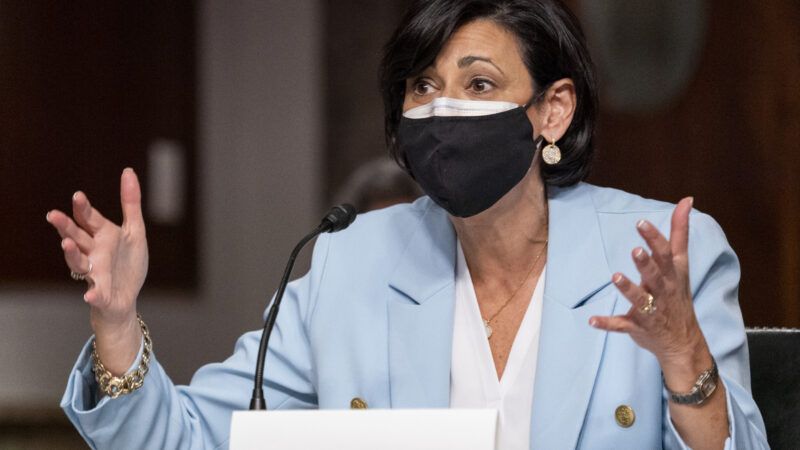The CDC Should Admit Its Errors To Regain Trust
The CDC thinks a monthlong review of COVID policies will be sufficient to redress their errors.

Last week, in an attempt to rebuild its tattered reputation, the Centers for Disease Control and Prevention (CDC) announced via email a forthcoming "revamp" of the agency. The supposed overhaul is at least a year late and more than a dollar short. The proposed overhaul will be based on a one-month review to "kick off an evaluation of CDC's structure, systems, and processes."
CDC Director Rochelle Walensky has already handpicked a leader: an administrator from another division within the Department of Health and Human Services; three CDC officials will also conduct the review.
This is a mistake. For an agency that has seen a drop in trust of more than 25 percentage points in less than two years, having a bipartisan committee choose the reviewers is necessary and important to establish their credibility. In recent history, Congress has formed bipartisan advisory commissions that, in the wake of crises, direct outside experts to analyze mistakes and figure out how to avoid them in future. Commissions such as the Financial Crisis Inquiry Commission, the 9/11 Commission, and the Warren Commission (investigating John Kennedy's assassination) were convened after crises to investigate causes and suggest reforms to systemic weaknesses that precipitated them. As a recent RAND report put it, commissions can be "insulated from the partisan passions that underlie our politics and our society." As such, a commission could bring a constructive neutral lens that is much-needed in understanding why and how the CDC failed to adequately guide us through the pandemic.
How does the country ranked first in pandemic preparedness on the Global Health Security Index in 2019 fail when it comes time to act?
Mistakes, especially in early days of complex and difficult situations, are understandable and unavoidable. And some things did go right—like the CDC's concerted efforts and partnerships with marginalized communities to raise vaccination rates in those groups, and the recent pivot away from solely focusing on transmission rates to using hospitalizations as the key metric for mitigations. But the laundry list of COVID-era policy failures originating with the agency is largely unexamined, and in some cases, still persisting.
The list of errors made by the CDC is so lengthy that a one-month process—an entirely arbitrary time period—will all but guarantee that the review is superficial and toothless. CDC guidance is responsible for some of the longest school closures in the world due to myopic policies that were overly focused on cases and transmission. School closures, where students of all ages were instructed to stay home and even avoid the outdoors, led predictably to significant rises in learning loss, mental health issues, obesity, and substance use disorders. The CDC's shockingly unethical and underreported alliance with the American Federation for Teachers, the nation's largest teachers union, also cast doubt on who exactly was steering the CDC ship as they crafted school guidelines.
The CDC also ignored natural immunity when drafting federal-level vaccine mandates and allowing exemptions to testing, policies that were then duplicated on the state level, resulting in the firing of thousands of healthcare workers and public employees. They oversold the benefits of masking post-vaccination, with no randomized controlled trials (RCTs) conducted to show efficacy, and failed to run any RCTs that might have addressed the weakness of data guiding many of their interventions. They supported useless travel bans that punished countries such as South Africa that were diligently tracking new variants, and were partially responsible, along with slow approval of new tests by the FDA, for the paucity of COVID tests that inexcusably persisted up to and during the omicron surge. This shortage left people lining up for hours outside of testing centers ahead of the December holidays, while Europe and parts of Asia had rapid tests widely available for months, including in vending machines. Other glaring errors include withholding COVID data, providing inaccurate statistics, and relying heavily on other countries' data—like Israel and the U.K.—for disease tracking and efficacy trials of vaccines and boosters.
CDC mismanagement has left a majority of Americans feeling "confused" by public health recommendations after an endless barrage of unclear messaging and opaque decision making that has left the public viewing CDC guidance as political messaging rather than policy based on scientific evidence. Not surprisingly, America now has one of the lowest vaccination rates among wealthy countries.
While a thorough bipartisan review of the CDC's approach to the pandemic is necessary and prudent, a full analysis takes time. In the interim, the CDC could take an important first step in restoring trust: admit its mistakes and apologize. This would help bolster Americans' confidence that harmful policies will not be reimplemented and that steps are being taken to safeguard processes in future.
The Health Minister for British Columbia's CDC issued an apology after releasing confusing guidance on their website. Israel's vaccine adviser apologized for his role in school closures, saying he was "extremely sorry" and that "education was the one thing that we should not have touched. Never. Never." As early as June 2020, Norway's prime minister said some measures such as school closures "may not have been necessary" and that she "probably took many of the decisions out of fear."
Without any kind of admission of regret from U.S. public health officials, it will be difficult to take gestures of accountability seriously. If the official account of the COVID response is merely a superficial whitewashing of COVID-era failures, the damage to public health may be decades long or, even worse, irreparable.
